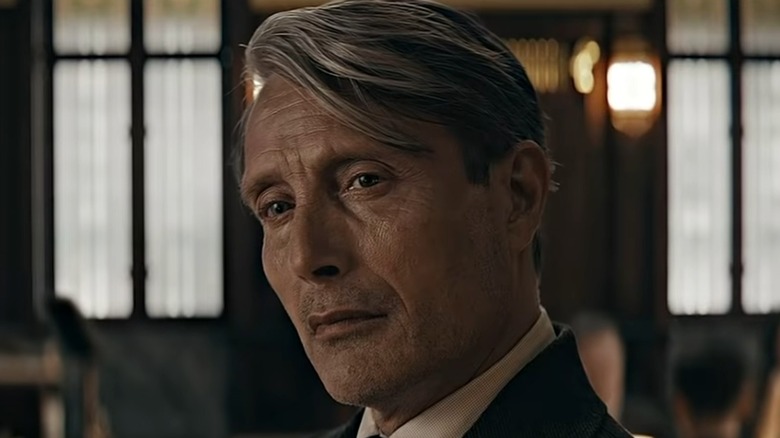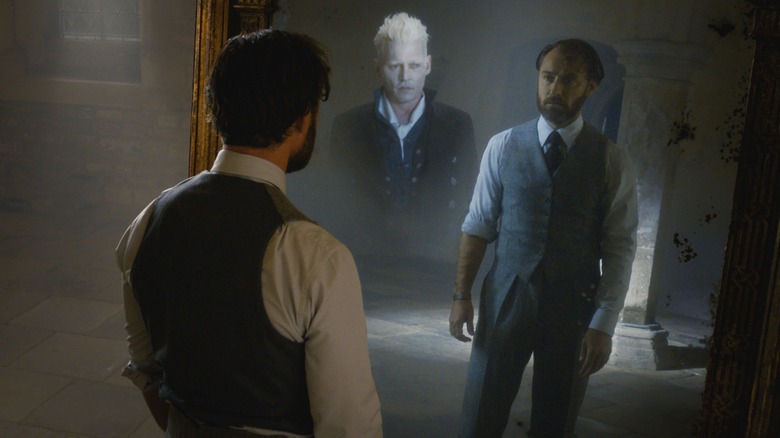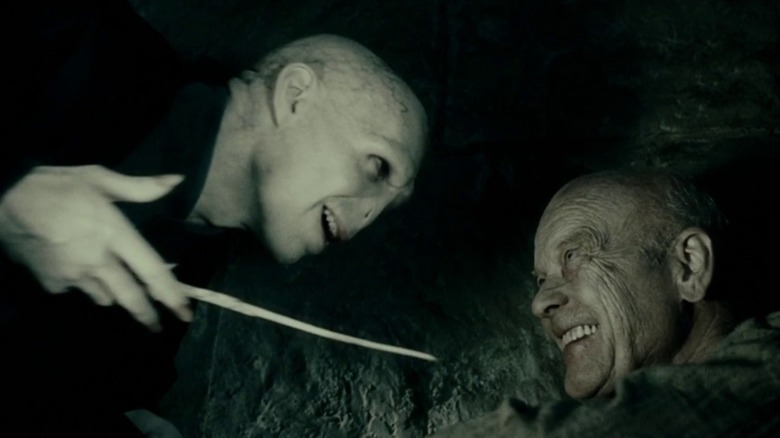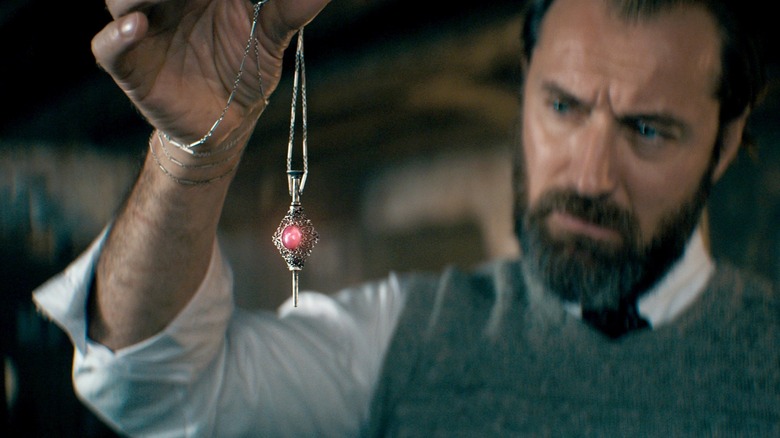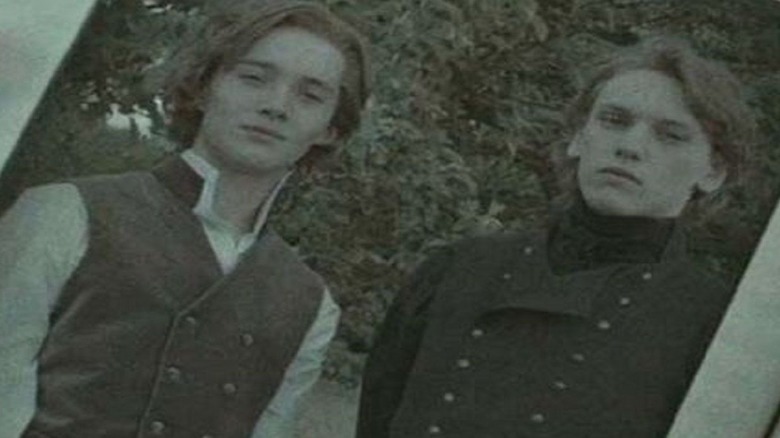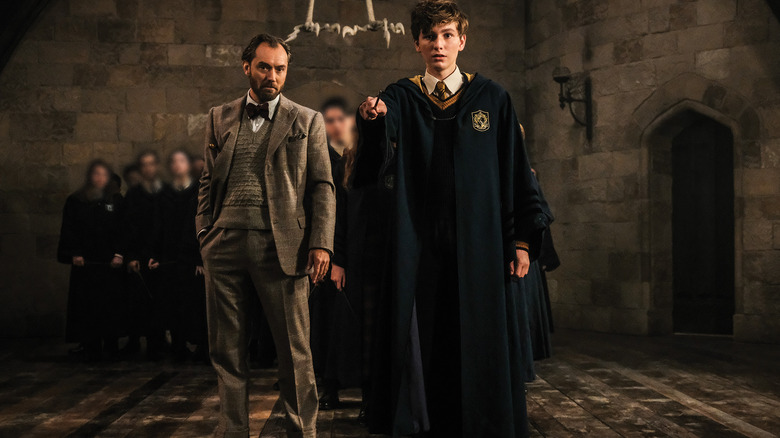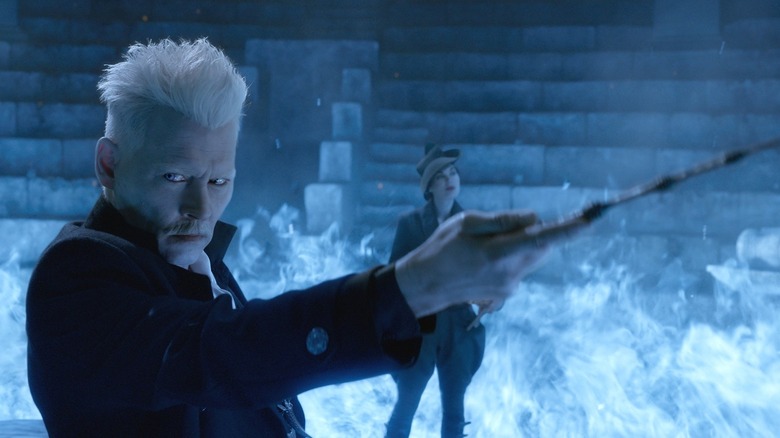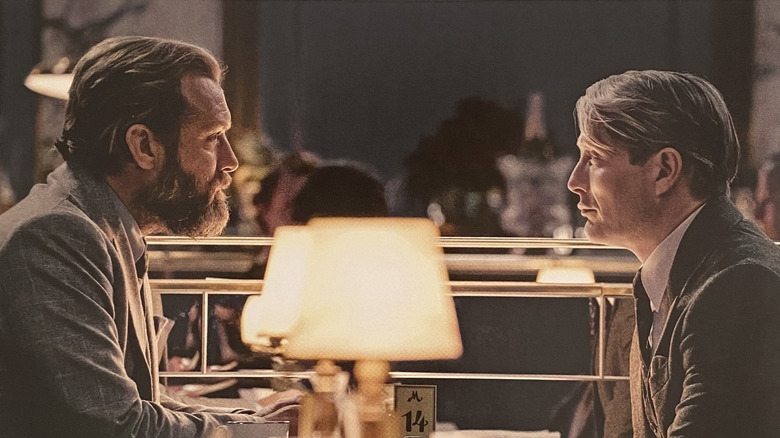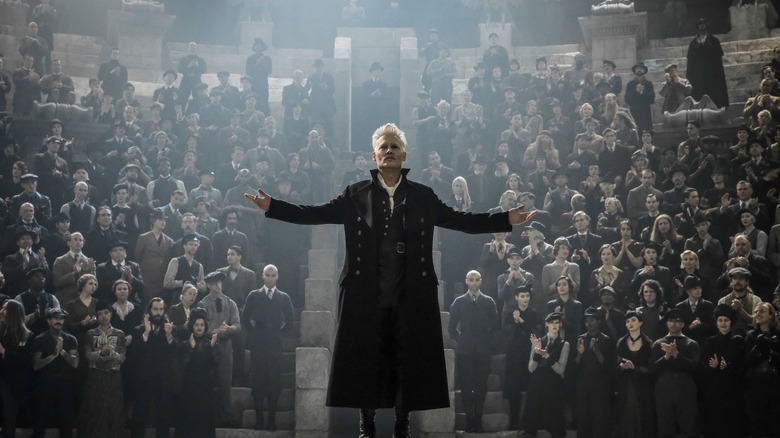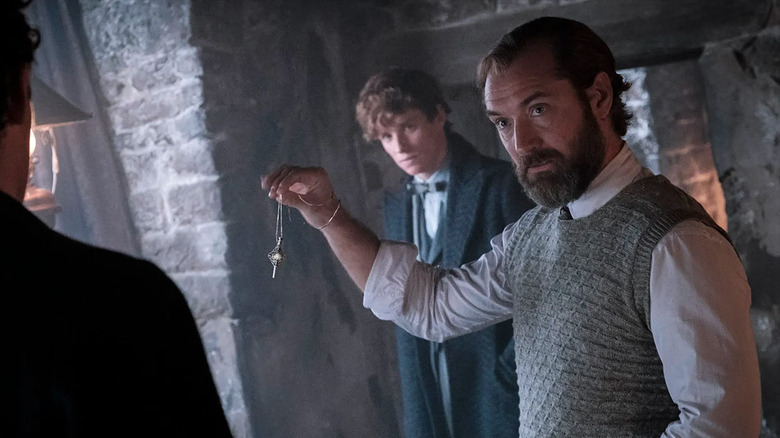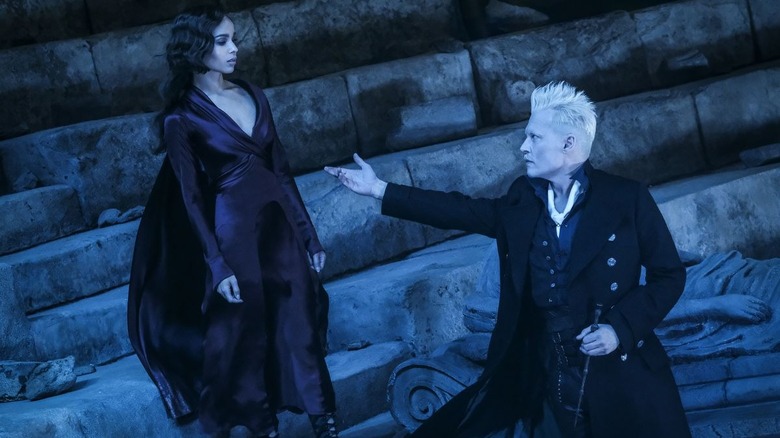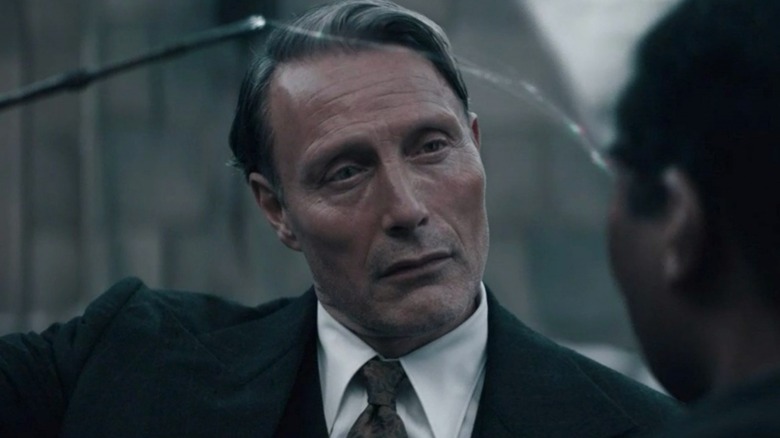The Untold Truth Of Fantastic Beasts' Grindelwald
Ever since the release of the original novel by J.K. Rowling in 1997, few entertainment franchises in history have dominated the pop culture landscape the way "Harry Potter" has. In 2016, a new chapter was added to the world of "Harry Potter" with the release of the film "Fantastic Beasts and Where to Find Them." The movie takes place several decades before the birth of the famous boy wizard Harry Potter, following the adventures of magizoologist Newt Scamander (Eddie Redmayne) in America. The overarching villain of the "Fantastic Beasts" franchise is the evil wizard Gellert Grindelwald, played by Johnny Depp and later Mads Mikkelsen.
The first mention of Grindelwald was found in the original "Harry Potter" novels, where he was stated to be the second-most powerful dark wizard of all time behind Lord Voldemort. Through the "Fantastic Beasts" series, viewers get to see Grindelwald's rise as the greatest threat the wizarding world had ever faced thus far, as well as his eventual defeat at the hands of Albus Dumbledore (Jude Law). Here are some lesser-known facts about Gellert Grindelwald to help you better understand the character.
A dark twin to Dumbledore
The similarities between Harry Potter and his arch-enemy Lord Voldemort were often pointed out in the original "Harry Potter" series. Both were half-blood orphans descended from the Peverell family. They suffered a neglectful childhood, spoke to snakes, and exhibited remarkable stubbornness in accomplishing their goals, even if they had to break the rules to do so.
The main hero and villain of "Fantastic Beasts," Albus Dumbledore and Gellert Grindelwald, also have many similarities. The two are generally understood to be the greatest wizards of their time, with about equally matched intelligence and skill level. The duo also shared many of the same beliefs in wizarding superiority, which led them to working together in their youth.
But where the duo differ is the lengths they are willing to go to in order to accomplish their goals. Dumbledore has a strong conscience, and the desire to look after his family after he was left in charge of his mentally disturbed sister Ariana. In an interview with PotterCast (via Accio Quote!), J.K. Rowling described Grindelwald as Dumbledore's "Dark twin," who offered Dumbledore a way out of his obligation towards his sister by convincing Dumbledore that his sister would no longer need to be kept hidden away once wizards established dominion over muggles.
The polar opposite of Voldemort
One big problem with setting Gellert Grindelwald up as the main villain of the "Fantastic Beasts" series is that he will forever be compared to Lord Voldemort. To put an end to the comparisons, the "Fantastic Beasts" movies have attempted to show Grindelwald as the almost polar opposite of Voldemort in how he operates.
Voldemort believed in beating his enemies into submission with extreme brutality until they were left too terrified to oppose him. On the other hand, we have seen Grindelwald go to great lengths to convince his fellow wizards of the righteousness of his cause, rather than trying to bully them into following him. Even Grindelwald's handsome appearance is in stark contrast to Voldemort's terrifying visage, which helps Grindelwald's followers see him as a charismatic leader.
"He's a sociopath," was how J.K. Rowling described Grindelwald in an interview (via SnitchSeeker.com), adding, "We watch him corrupt an innocent, and we see his immense, duplicitous gift of speech, in the final scene where we really see the danger of the man." Thus, Grindelwald uses his powers and mind with a great deal more finesse than Voldemort. A final point of difference between the two characters is that Voldemort was famously incapable of loving anyone, whereas Grindelwald is shown to still be in love with his old flame Albus Dumbledore.
A changing narrative
While Gellert Grindelwald took center stage in the "Fantastic Beasts" series, he was first brought to the attention of fans in the original "Harry Potter" novels. There, Grindelwald was referred to as the only Dark Wizard capable of rivaling the might of Lord Voldemort in his prime, and also being an unexpected ally of Albus Dumbledore in their youth.
The relationship between Grindelwald and Dumbledore provided a shock to "Harry Potter" fans when J.K. Rowling revealed that Dumbledore was gay and in love with Grindelwald in his younger days. Back then, Rowling implied that the relationship had been one-sided, because while Dumbledore had genuinely been in love with Grindelwald, the latter had only been manipulating Dumbledore's feelings for him to help in his search for the Deathly Hallows. "I think [Grindelwald] was a user and a narcissist and I think someone like that would use it, would use the infatuation," Rowling said in an interview with Melissa Anelli. "I don't think that he would reciprocate [Dumbledore's feelings] in that way."
This particular narrative was changed by the time the "Fantastic Beasts" franchise was being written. Here, we see that both Dumbledore and Grindelwald had genuinely been in love with each other in the past and continue to have feelings for each other. Another major change was the introduction of the magical "blood pact" that prevents Dumbledore and Grindelwald from fighting each other directly, which found no mention in the original "Harry Potter" storyline.
Dark Origins
To truly understand Grindelwald as we see him in the "Fantastic Beasts" franchise, we have to go back to his childhood to understand his influences. Born in the late 1800s, Grindelwald came from a privileged family that included noted historian Bathilda Bagshot as his great-aunt.
After coming of age, Grindelwald was sent to Durmstrang Institute for his education. The young wizard was naturally brilliant from the start. He also found the atmosphere at Durmstrang particularly conducive to his studies, because there was an emphasis on learning dark and powerful spells which Grindelwald naturally gravitated towards. Unlike Hogwarts, which sought to educate its students in "Defence Against the Dark Arts," Durmstrang taught its students the Dark Arks itself under the misguided belief that knowing such spells made you a more powerful and able wizard.
Soon Grindelwald's brilliant mind sought to expand his curriculum in innovative ways, and he started performing a series of twisted experiments connected to the Dark Arts. For a time, the authorities at the school tried to turn a blind eye to Grindelwald's activities. But eventually his experiments grew too horrific to be ignored, and Grindelwald was expelled from Durmstrang under a cloud of suspicion and disrepute.
Meeting a young Dumbledore
After the reasons behind Grindelwald's expulsion became public knowledge, it was decided that he needed to lie low for a while until the incident could recede from people's memory. To that end, Grindelwald was sent to live with his great-aunt Bathilda Bagshot in the town of Godric's Hallow.
Upon arriving there, Grindelwald was stunned to make the acquaintance of a young man of similar age and intelligence named Albus Dumbledore. Like Grindelwald, Dumbledore had already won great renown as an extraordinary wizard. The duo became close friends, and eventually lovers, as Grindelwald discovered that he also had many philosophical and sociological goals in common with Albus.
Together the ambitious young wizards made plans for the future, even though Dumbledore was too naïve to see the true nature of Grindelwald's plans for humanity. "[Dumbledore] fell in love with Grindelwald," J.K. Rowling explained in an interview with The Leaky Cauldron, "[Dumbledore's feelings for Grindelwald] added to his horror when Grindelwald later showed his true nature."
For the greater good
For fans who only knew Albus Dumbledore as the smiling, benevolent force shown in the "Harry Potter" series, it can be difficult to imagine a younger version of him plotting with Grindelwald to become world dictators who would establish wizarding supremacy.
But Dumbledore back them was a very different person from who he became in his old age. He had suffered greatly at the hands of muggles, who had attacked his mentally ill sister Ariana. When his father retaliated against the muggles, he was sent to Azkaban, and Albus was forced to leave his studies midway and come home to look after his sister and brother Aberforth. There, he met the dashing and charismatic Gellert Grindelwald.
Filled with anger and impatience, Dumbledore quickly fell for Grindelwald's rhetoric about how muggles were stupid and fearful and needed the rule of wizards to keep them in line. Dumbledore saw himself and Grindelwald as benevolent dictators who could bring order to the world through the subjugation of muggles. In fact, it was Dumbledore who came up with the motto "For the greater good," which Grindelwald would later use to rally his own army around his cause.
Regretting his past
After plotting together for so long, Grindelwald and Dumbledore had a falling out after the former attacked Aberforth and Ariana, resulting in the death of Ariana in front of Dumbledore's eyes. His partnership with Dumbledore ended, Grindelwald continued to plot his own rise to power over the next few decades.
The next chapter of the story is shown in the "Fantastic Beasts" franchise. Grindelwald's efforts to start a war between wizards and muggles draws the attention of the international wizarding community, including Dumbledore. At first, Dumbledore was forced to work against Grindelwald through his associates, since the blood pact meant he could not confront Grindelwald directly. Eventually, the blood pact gets destroyed, and Dumbledore and Grindelwald meet in a legendary battle for the ages, during which Dumbledore manages to finally defeat Grindelwald and put him in prison.
It is indicated in the "Harry Potter" books that Grindelwald came to regret his past actions in his later years, to the point that he refused to cooperate with Lord Voldemort in finding the location of the immensely powerful Elder Wand. But this plot point is changed in the movies, where Grindelwald gleefully provides Voldemort with the knowledge of the Elder Wand's resting place.
The rumored kiss
While the "Fantastic Beasts" franchise started out being about Newt Scamander trying to hunt down magical creatures, the main plot is about Grindelwald's attempts to start a wizarding world war, and Dumbledore's efforts to halt Grindelwald's plans with the help of the Order of the Phoenix.
This has placed the relationship between Grindelwald and Dumbledore front and center of the narrative. Since the two were former lovers, fans have wondered whether their past romantic relationship will be referenced in the "Fantastic Beasts" movies, and whether we will finally get to see actual scenes confirming Dumbledore's sexuality rather than it being referenced in behind-the-scenes commentary.
Fans got some of what they were asking for in 2022's "Fantastic Beasts: The Secrets of Dumbledore." In one of the most importance scenes in the movie, Dumbledore and Grindelwald sit down in a diner and admit their love for each other. Grindelwald then departs.
The oddly likeable villain
One of the biggest surprises of 2018's "Fantastic Beasts and Where to Find Them" was the revelation at the end of the movie that the role of the villanouse Gellert Grindelwald would be played by Johnny Depp. At the time, the actor was best known for his role as the rascally and much-loved pirate Captain Jack Sparrow.
Many wondered whether audiences would be able to accept Depp in the role of the bad guy. But the actor explained that he was not approaching the role of Grindelwald as a typical villain whom the audience is supposed to hate. "To me, there's something almost childlike in [Grindelwald]," Depp stated in an interview with EW, adding, "His dream is for the wizard world to stand tall and above."
While conceding that there was a "fascist" element to how Grindelwald went about his dream of achieving wizarding supremacy, Depp offered his understanding of Grindelwald as a "dreamer." This is what makes the character so dangerous, because he will stop at nothing to turn his dream into a reality. The actor also described Grindelwald as an "oddly likeable character" who does not dream of doing hardcore evil things everyday, but rather wants to convince the rest of the wizarding community of the righteousness of his cause.
Jealous of Newt Scamander
At the start of the "Fantastic Beasts" series, it looked like the main focus of the story was going to be magizoologist Newt Scamander. But with each new installment in the series, Newt receded steadily into the background as Albus Dumbledore's rivalry with Gellert Grindelwald began to take center stage.
But Newt is still one of the main characters in the franchise, and Dumbledore's right-hand man who leads the fight against Grindelwald when Dumbledore himself was constrained by the blood pact. This closeness between Newt and Dumbledore has not escaped the notice of Grindelwald, and his interactions with Newt almost hint at a feeling of jealousy on Grindelwald's part.
Johnny Depp himself confirmed that the jealousy is very much present within Grindelwald over how he sees Newt as the "New man" in Dumbledore's life. "I think there's a jealousy with Scamander," Depp explained to EW. "[Grindelwald] sees Scamander as Dumbledore's protégé — his boy, in a way. That in itself is enough for Grindelwald to want to take Scamander down in a way that is ferocious and eternal." This explains why Grindelwald appears to show special malevolence towards Newt, despite the latter not being much of a threat to Grindelwald on his own without Dumbledore's backing.
The Grindelwald who was too convincing
As noted earlier, Johnny Depp did not see Grindelwald as a stereotypical "villain," but rather as an ambitious dreamer who fervently believed in his own cause and was able to use his words to rally people to it. A charismatic leader was how Depp portrayed Grindelwald, and that ended up making the character a bit too likeable.
Grindelwald gets his first important scene in 2018's "Fantastic Beasts: The Crimes of Grindelwald." In a large hall surrounded by his peers, Grindelwald launches into an impassioned speech explaining how the world was being destroyed by non-magical humans, and the only path to salvation was to rule over muggles with an iron fist. Depp ended up being so persuasive in the scene that it had to be reshot because the audience was sympathizing with him too much.
"We'd show [the scene] to an audience," the film's director David Yates explained in behind-the-scenes commentary. "And people kind of went, 'Yeah, he's got a point.'" Because it would not work for the franchise if the audience started rooting for Grindelwald, the makers reworked the scene to make the character scarier and more like a traditional villain.
The new Grindelwald
After receiving praise for his role as Gellert Grindelwald, Johnny Depp was abruptly ousted from the "Fantastic Beasts" franchise over claims of abuse levelled at the actor by his ex-partner Amber Heard. Following Depp's departure, it was announced that the role of Grindelwald would be continued by Mads Mikkelsen.
When the trailer for "Fantastic Beasts: The Secrets of Dumbledore," the first movie in the series featuring Mikkelsen as Grindelwald debuted, fans were surprised to see that the actor's version of the character looked very different physically from Depp's version of Grindelwald. The changed appearance not being addressed in-film was a deliberate choice on the part of the movie's creative team.
"Everybody knows why [the actors changed]," Mikkelsen stated in an interview with The Hollywood Reporter. "It would almost be like an Easter egg to reality to point out we swapped actors. Hopefully we drag them in with the first scene and from there they accept this world." Apart from the physical changes, Mikkelsen's take on Grindelwald is more forceful and smoldering than Depp's. The actor has expressed interest in continuing to play Grindelwald up until the iconic final battle with Dumbledore that is poised to bring an end to the "Fantastic Beasts" franchise.
